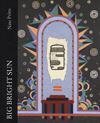Big Bright Sun
When reading the poetry of Nate Pritts, one gets the sense that his drive to write poetry originated from the ecstatic strain of the Beat Generation, namely through the poetry of Philip Whalen and the Ginsberg of “Supermarket in California,” as opposed to the more apocalyptic strain personified by Burroughs and Ginsberg’s “Howl.” This is the strain that has it that all of nature and even some man-made objects are imbued with a holy light and the possibility of transcendence. This is a source of yearning and salvation for Pritts, as he writes in the first poem of his fourth book, Big Bright Sun, “There are literally / hundreds of roses I could pick today // or leave for tomorrow & the evening / of a different year, the purple evening.” In the book, this is especially true of the sun:
When reading the poetry of Nate Pritts, one gets the sense that his drive to write poetry originated from the ecstatic strain of the Beat Generation, namely through the poetry of Philip Whalen and the Ginsberg of “Supermarket in California,” as opposed to the more apocalyptic strain personified by Burroughs and Ginsberg’s “Howl.” This is the strain that has it that all of nature and even some man-made objects are imbued with a holy light and the possibility of transcendence. This is a source of yearning and salvation for Pritts, as he writes in the first poem of his fourth book, Big Bright Sun, “There are literally / hundreds of roses I could pick today // or leave for tomorrow & the evening / of a different year, the purple evening.” In the book, this is especially true of the sun:
What could be wrong? There is right now a big yellow orb
hanging overhead &, no, it won’t fall &, yes,
it is beautiful; everything around you is beautiful. You
is beautiful. You is stunning, shocking the whole world
blind.
The sun offers a visible, ever-present demonstration of beauty in the world, and for Pritts, offers clarity, even the possibility of transcendence. The last three lines give us the speaker’s other sense of worldly relief, the “you” of these poems, the beloved who is there (and sometimes not), alternately giving rise to calm and burning desire. The poems work to subsume the mundane instances of life beneath the sun’s radiance. This is a rallying point for Pritts, “I never want to live in a society that forgets // the sun is in the air,” he writes early on.
This is easier said than done, as life has a way of getting in the way of enlightenment. “Suddenly, / you’re waving to everyone you see, / hopping mad when they don’t say hello back.”
The poems continue from their effusive beginnings through tours of quotidian frustration, which also characterize the poems:
All around me the fabric frays, threadbare
& laundered one time too many.
But I read the label so carefully …
and
My neighbor is hammering
his porch back together which is the inverse
of that endless summer I spent pissing everybody off
& could feel the nails slowly pulling out.
Through these movements between effusion and frustration we start to see how Big Bright Sun operates. The moments describing the sun, the flowers, the beauty of the world—often wedged in the middle of complaint—suggests the idea of mindfulness, or meditation to combat anger and frustration:
I do not feel colorful or round or various.
But it is safe to assume some kind of correspondence
between outer states & inner,
isn’t it?
The poetry will abruptly shift attention from complaint to the beauty of the outside world for moments that yield a sense of meaning, beauty, purpose, and the possibility of transcendence.
Put differently, these are forced moments. Adjectives are tacked on (“the sky is the same brilliant blue / as the sky on any sunny-outside day, a brilliant brilliance”), as if the actual thing cannot be adequately conveyed without them, or that the author does not trust the reader (or himself) to realize their specialness. The idea of “forced moments” is fraught with negative connotations—that work is not organic, or filled with artificial appendages. But Pritts’s use of them is intentional, as someone who practices mindfulness is using it intentionally.
As in real life, the use of mindfulness or meditation often comes at a point of greatest anger or frustration, and often the poems unfold similarly. Unlike certain kinds of anger or rage that have a clarifying or cathartic effect, the anger and frustration in Big Bright Sun is often helpless, and reflects more closely and honestly the life of adulthood. The result can sometimes be jittery and sometimes disconcerting.
Pritts realizes this, and his poems are often filled with humor in these situations, and he adds into some of his poems a sense of the ridiculous and excessively petulant:
…I will go away,
live in a cave & use my own breath as money.
When someone discovers me in my island cave
they will say something like “Loneliness
is expensive,” & I will breathe deep to pay myself back.
A sense of failure looms in these poems, but this is not a book of failure—for what life ever lives up to one’s expectation for it? Instead, Big Bright Sun is very engaged in the trenches of life.





